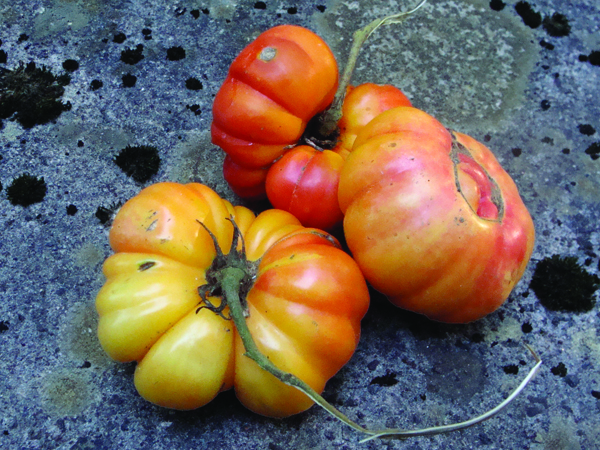 A local seed company quietly amasses a tomato treasure trove
A local seed company quietly amasses a tomato treasure trove
Hearing Happy Cat Organics’ Tim Mountz talk about tomatoes is enough to make any food-loving soul long for summer. Along with his wife Amy Bloom, Mountz has compiled a seed collection featuring 200 varieties of heirloom tomatoes. If that sounds like a lot, have no fear: Mountz promises to cap the operation at 250.
In 1993, Mountz’s grandfather, who was raised on a farm and kept a large garden, was killed in a car accident. Tim inherited all of his seeds. After some research, he came across William Woys Weaver in Devon, author of a book called Heirloom Gardening, and, with his help, began to decipher his inheritance. “It was so amazing,” says Mountz. “Some of the seeds were traded from Native Americans to the Germans when they first came to Pennsylvania, and now they’re in my hands. So, I started collecting everything I could get my hands on.”
When he married his wife Amy, she set to work organizing his treasure trove, and it eventually became a small business. “That’s the part that I love—the seeds and plants,” says Mountz. “Produce? Meh. I like to grow what I like to grow.”
Bloom works at Winterthur, the old Dupont estate in Kennett Square, and that is where they live and farm. This past year, they cultivated 172 distinct varieties of tomatoes (in addition to other plants such as heirloom beans, carrots, radishes and peppers). Mountz will be more than happy to tell you about each and every one. There’s the Coeur de Pigeon (heart of the pigeon), a beautiful little yellow tomato that looks like, you guessed it, a pigeon heart. Or his line of peach tomatoes, golf ball-sized orbs that are fuzzy on the outside rather than shiny. Mountz can sometimes sound more like a sommelier than a farmer: “They’re just really sweet,” he extols, “with really great characteristics—a lot of high, fruity tastes to them.”
When asked about a favorite, he throws back his head in exasperation at the impossible nature of such a question. He eventually settles on a tomato that he bred: the Black Ruffle. It’s a mix between Zapotec and Black Krim. “The Black Krim has smoky, salty, raisin-type fruits in it,” says Mountz. “Mind-blowing. I can still remember the day when I tried one for the first time.” The Ruffle is a stabilized version of a cross-breed that occurred naturally in the field. People seem to love it. “It’s like I wrote a song for the Clash,” says Mountz. “There are people raving about this tomato. And I’m just thinking, ‘Oh my god. It’s my baby.’”
Mountz’s enthusiasm is more than contagious; it’s inspirational. He is clearly captivated by the magic of seeds—put them in the ground, watch them grow, join a legacy. He is a proselytizer, and even went so far as to mail the Obamas some seeds for the White House garden.
“Most farmers, they grow eight varieties,” says Mountz. “And then they bring them to the market, and put a sign up that says ‘heirloom tomatoes.’ That’s boring. Each one has such an amazing history, and a story. You wouldn’t think I’d be able to remember 200 varieties, but I remember a little bit about each one, and if I don’t, I do know that it tastes frickin‘ amazing.”


